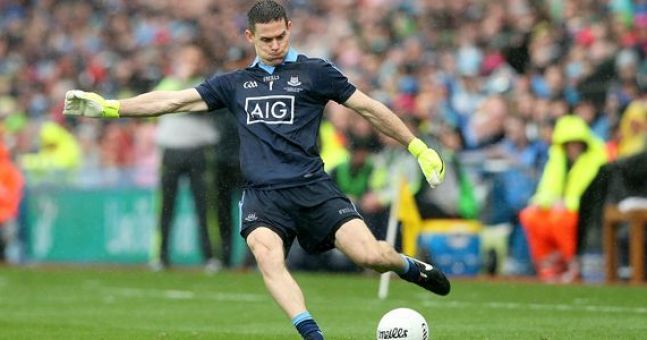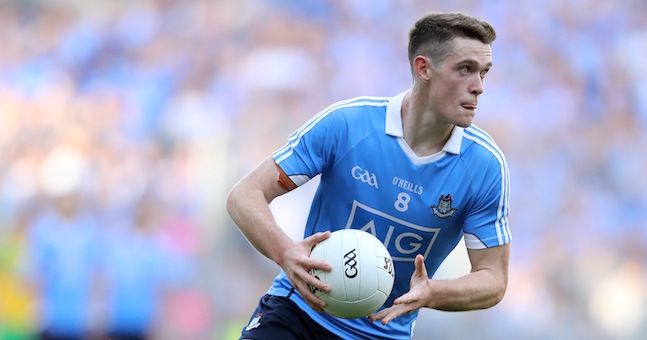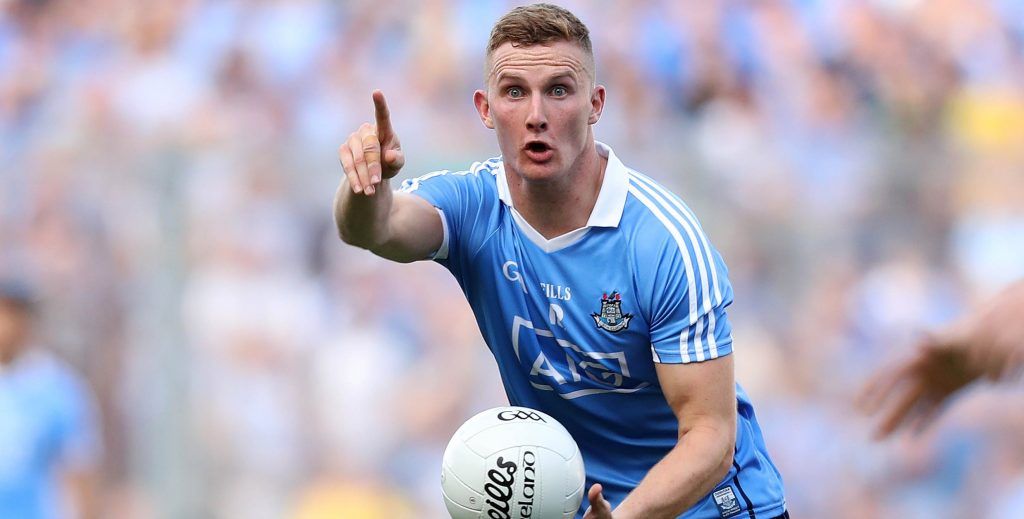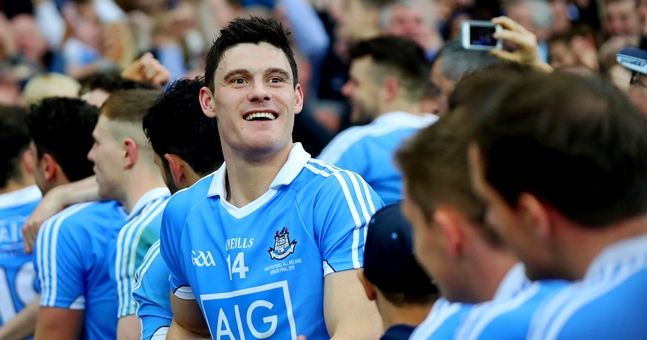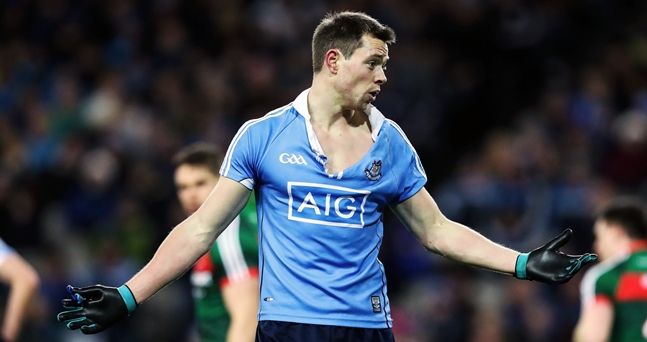Who are the men Jim Gavin cannot live without?
As Dublin prepare for the opening game of their quest for three-in-a-row missing quite a number of regulars, we look at which players are most key in order of significance.
1 Stephen Cluxton
Even on supposed bad days, like last year’s semi-final against Kerry, our figures show his net value in terms of kick-outs to scores, to be positive. Despite gifting Kerry a goal opportunity that they converted in that game, our figures showed that Dublin had actually made significantly more profit off their kick-outs than Kerry did, as Kerry kicked 12 long and hard and conceded 0-6 to 0-0 from them.
Dublin’s entire system is based on getting their kick-outs off quickly. When the opposition try to squeeze Dublin’s defence, Cluxton has the eye of an American football quarter-back, and the boot to go with it, to pick out any Dublin player with a yard of space, and ping it at their chest/head.
Furthermore, in all league games this year against the top five contenders, Dublin were eaten alive on breaks off their own kick-outs. They lost five from five against Kerry.
If this isn’t fixed for Championship, the importance of landing kick-outs in team-mates’ laps, as only he can, is going to be crucial.
Quite simply, in his absence, the bottom could fall out of the entire game-plan against Kerry, Mayo or others.
Nobody else can do what he does.
2 Brian Fenton
Before Fenton came along, Dublin had a choice between big and slow midfielders like Éamonn Fennell or smaller athletic ones like Michael Darragh Macauley and Cian O’Sullivan. Gavin’s game plan was clear when All-Ireland winner, Fennell, was axed upon Gavin’s arrival.
Key to Donegal’s success against Dublin in 2014 was Ódhran MacNiollas and Michael Murphy’s annihilation of Dublin at midfield. They scored 2-2 straight off their own kick-outs in the second half alone.
Personally, I’d have had Fennell on the bench, just to cover for that eventuality. His arrival off the bench in the 2011 final swung kick-outs radically back in Dublin’s favour, where they were being wiped out.
In Fenton, Dublin have a big fielder who is also athletic. On top off all of that, he’s undoubtedly one of the most technically able midfielders in the game. Unlike most modern midfielders, his first thought is to go forward, find a gap, and penetrate the opposition.
It’s no coincidence that his arrival coincided with Dublin’s back-to-back All-Ireland wins and record unbeaten win. Take him out of the side and Dublin could potentially be exposed on kick-outs as they were in the Donegal game in 2014.
Nobody else can do what he does.
3 Ciarán Kilkenny
Kilkenny’s style probably splits opinion nationwide down the middle. On one hand, he has taken individual possession stats to a new level, tipping a previously unheard of fifty in one game. His detractors will claim that that he only ever hand-passes the ball laterally or backwards a few metres and points.
Firstly, they’re wrong. Despite the fact that Kilkenny does indeed do that a lot, statistically, he was Dublin’s highest line breaker in the drawn final last year, with nine penetrative plays. In the replay he came in third, one behind Brian Fenton and Kevin McManamon.
All evidence suggests that he simply has the wisdom to know when to attempt to break the line, and when and where to switch the play with a short pass.
It’s worth noting that Real Madrid’s president, Florentín Peréz made the same accusations about Claude Makélélé’s passing laterally and backwards before shipping him out, and watching the Galacticos plummet radically after he left, while the Chelsea side he joined sky-rocketed.
Even more noteworthy than Fenton, Kilkenny has won three All-Irelands in a row. He missed the 2014 season through injury.
He’s the game controller extraordinaire who brings all of the other parts together, brilliantly. An added bonus is that he can play in any position, so he can be slipped into the half-back line or as an extra midfielder, or as sweeper, seamlessly, without Jim Gavin having to re-shuffle the whole pack.
He may not be everybody’s cup of tea, but his absence would probably epitomise the expression “you don’t miss the water until the well runs dry”.
Nobody else can do what he does.
4 Diarmuid Connolly
Clearly the most technically able footballer in the country, he can weave scores out of nothing, and lesser noted, is also a highly intelligent and able game controller on the ball.
Sadly, the rules don’t seem to be able to protect him, as man-handling off the ball has become almost expected.
For all of his ability, he is markable. Lee Keegan kept him to 14 possessions, one point and only three line breaks against four turnovers in the drawn final last year, while his figures read even less favourably before Keegan was black-carded in the replay.
Typically, however, he poses an immense threat, capable of scoring from all angles, and reducing military like blanket defences to nothing with a couple of side-steps and 50-yard pointed kicks.
Even where he’s being well man-marked, it means that he requires the attention of the opposition’s best man-marker, letting Kevin McManamon slip under the radar.
Nobody else can do what he does.
5 Dean Rock
Undoubtedly, he is a significant asset as a forward, but Dublin have forwards coming out their ears. Connolly or McManamon aside, there are probably no out-and-out attacking forwards, who don’t have another who could typically fill their shoes.
Lose Bernard Brogan or Paddy Andrews and one could fill the other’s shoes. Lose Paul Mannion or Cormac Costello and it’s the same. It’s unlikely that more than two, or certainly three of those would be on the field at the same time.
So why is Rock so valuable? For frees? No! Cluxton could kick those with roughly the same level of accuracy.
Apart from his great brain bringing a method and control to the attack, his brain brings something with a value that is completely undervalued by most.
To give the most extreme example, the difference between Kerry getting off a short kick-out and being forced to go long in last year’s final was worth an expected value of 0.83 points!
Kerry scored 0-5 from 10 short kick-outs (and conceded none upon the first turnover on the other five) while they conceded 0-6 and scored zero from 18 long kicks.
Who is the at the fulcrum of making sure Dublin are pushed up correctly, man on man? That’s right. Even before Rock kicks a free, you’ll see he’s making sure all is in order to prevent the short kick-out.
It requires a reasonable amount of intelligence and an immense amount of discipline where most players are typically lost in a post-score rush of adrenaline.
If you under-estimate the significance, consider the expected figures if Kerry had got off six more short kick-outs and six less long ones in last year’s semi-final. You could have expected them to score three points more and concede two points less. Dublin won by two.
Nobody else appears to be able to do what Rock does.

